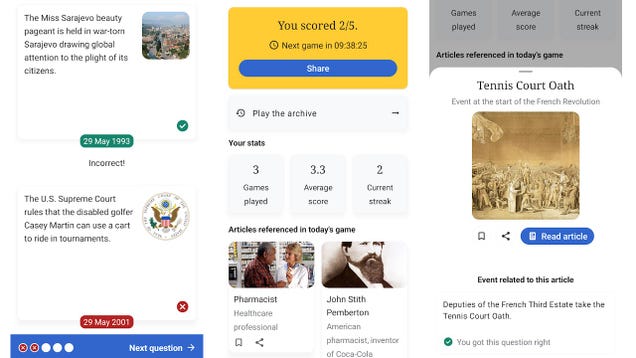Wikipedia Is The Latest Place To Join The Daily Gaming Craze
The Rise of Daily Word Puzzles: From Newspapers to Global Phenomenon

For as long as newspapers have existed, they've provided readers with brain teasers and puzzles. Crossword puzzles, in particular, have enjoyed a long and enduring popularity, becoming a staple in many publications worldwide. These puzzles offer a delightful blend of challenge and satisfaction, engaging players in a quest to decipher clues and fill the grid. However, the world of word puzzles experienced a seismic shift in early 2022 with the acquisition of Wordle by The New York Times.
Wordle: A Global Craze
Before its acquisition, Wordle was a relatively unknown online game. It was simple in its design, elegant in its execution, and utterly addictive in its gameplay. The premise was straightforward: guess a five-letter word in six tries, receiving feedback after each attempt in the form of colored tiles indicating whether letters were correct, misplaced, or incorrect. This deceptively simple mechanic captivated millions.
Wordle's genius lay not just in its gameplay but also in its social aspect. Players eagerly shared their results on social media, using a simple color-coded grid to represent their progress. This created a sense of community and friendly competition, further fueling the game's popularity. The daily limitation of one puzzle per day also contributed to its success; it fostered anticipation and a sense of shared experience among players.
The New York Times' purchase of Wordle signaled a significant moment in the world of online gaming. It demonstrated the immense potential of simple, yet engaging, games to capture a massive global audience. It also highlighted the growing importance of online puzzle games within the broader digital entertainment landscape.
The Expanding World of Daily Challenges
The success of Wordle didn't just revitalize interest in word puzzles; it also inspired other media outlets and developers to create similar daily challenges. The impact was widespread, demonstrating the infectious nature of the Wordle phenomenon.
Following the Wordle trend, many other publications and developers began launching their own variations on the popular word game. This led to a surge in the creation of similar word puzzles, each with its own unique twist and appeal.
The Appeal of Daily Word Puzzles
The enduring popularity of daily word puzzles like Wordle can be attributed to several factors. Firstly, they offer a readily accessible form of mental stimulation. They require minimal equipment (just a device and internet access) and can be played in short bursts, fitting easily into busy schedules. Secondly, the puzzles provide a sense of accomplishment upon completion. The feeling of successfully guessing the word, particularly after several failed attempts, is intrinsically rewarding.
Furthermore, these games often foster a sense of community. Sharing results on social media allows players to connect with friends and family, engaging in lighthearted competition and conversation. This social element adds another layer of enjoyment to the experience, transforming a solitary activity into a shared pastime.
The daily format is also crucial. The limitation of one puzzle per day builds anticipation and creates a routine. This daily engagement contributes to the habit-forming nature of these games, encouraging players to return regularly for their daily dose of mental exercise.
The accessibility of these puzzles is another key factor in their success. Unlike complex board games or video games that require extensive rules or significant time investment, word puzzles are easy to learn and understand. This allows players of all ages and skill levels to participate, widening their potential audience substantially.
The Future of Daily Word Puzzles
The rise of Wordle and similar games signals a shift in the way we consume entertainment. These simple yet engaging games are filling a niche, offering a quick and satisfying way to engage our minds and connect with others. It's likely that we will continue to see innovation in this space, with new and creative word puzzles emerging to challenge and delight players.
The integration of these puzzles into established media outlets, such as The New York Times and The Atlantic, indicates their growing legitimacy and mainstream appeal. This suggests a long and fruitful future for daily word puzzles, cementing their place in our digital culture.
As technology advances, we can expect to see even more sophisticated and interactive word puzzles emerge. These might incorporate augmented reality, personalized challenges, or other innovative features to keep players engaged and entertained. The core appeal, however – the satisfying challenge and social connectivity – will likely remain the driving force behind the continued popularity of these captivating games.
The success of Wordle and the subsequent rise of similar daily challenges demonstrate the power of simple, well-designed games to captivate a global audience. The inherent appeal of these puzzles, combined with their accessibility and social aspects, ensures their continued relevance and evolution in the ever-changing world of digital entertainment.
The future of daily word puzzles appears bright. With continuous innovation and a dedicated player base, these games promise to remain a popular form of entertainment for years to come, offering a delightful blend of challenge, satisfaction, and social connection.
Further reading: Kotaku article on Wordle and Daily Puzzles
from Kotaku
-via DynaSage

